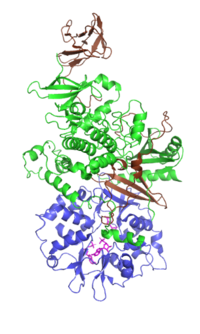
Photo from wikipedia
Liquid-ordered (Lo) membrane domains have been proposed to play important roles in a wide variety of biological processes, such as protein sorting and cell signaling. However, the mechanisms by which… Click to show full abstract
Liquid-ordered (Lo) membrane domains have been proposed to play important roles in a wide variety of biological processes, such as protein sorting and cell signaling. However, the mechanisms by which they are formed and maintained remain poorly understood. Lo domains are formed in the vacuolar membrane of yeast in response to glucose starvation. Here, we show that deletion of proteins which localize to vacuole membrane contact sites caused a marked decrease in the number of cells with Lo domains. In addition to Lo domain formation, autophagy is induced upon glucose starvation. However, deletion of core autophagy proteins did not inhibit Lo domain formation. Thus, we propose that vacuolar Lo domain formation during glucose restriction is regulated by membrane contact sites but not by autophagy.
Journal Title: FEBS letters
Year Published: 2023
Link to full text (if available)
Share on Social Media: Sign Up to like & get
recommendations!